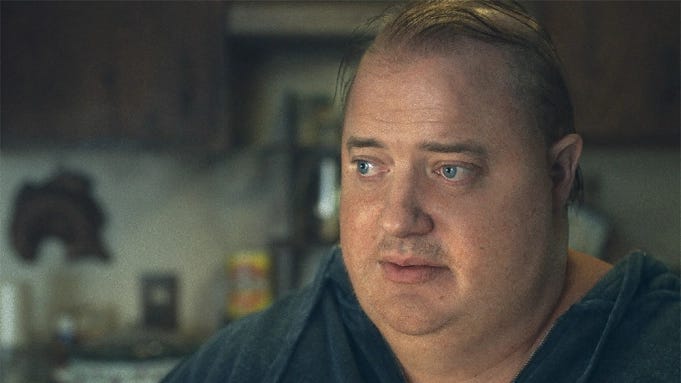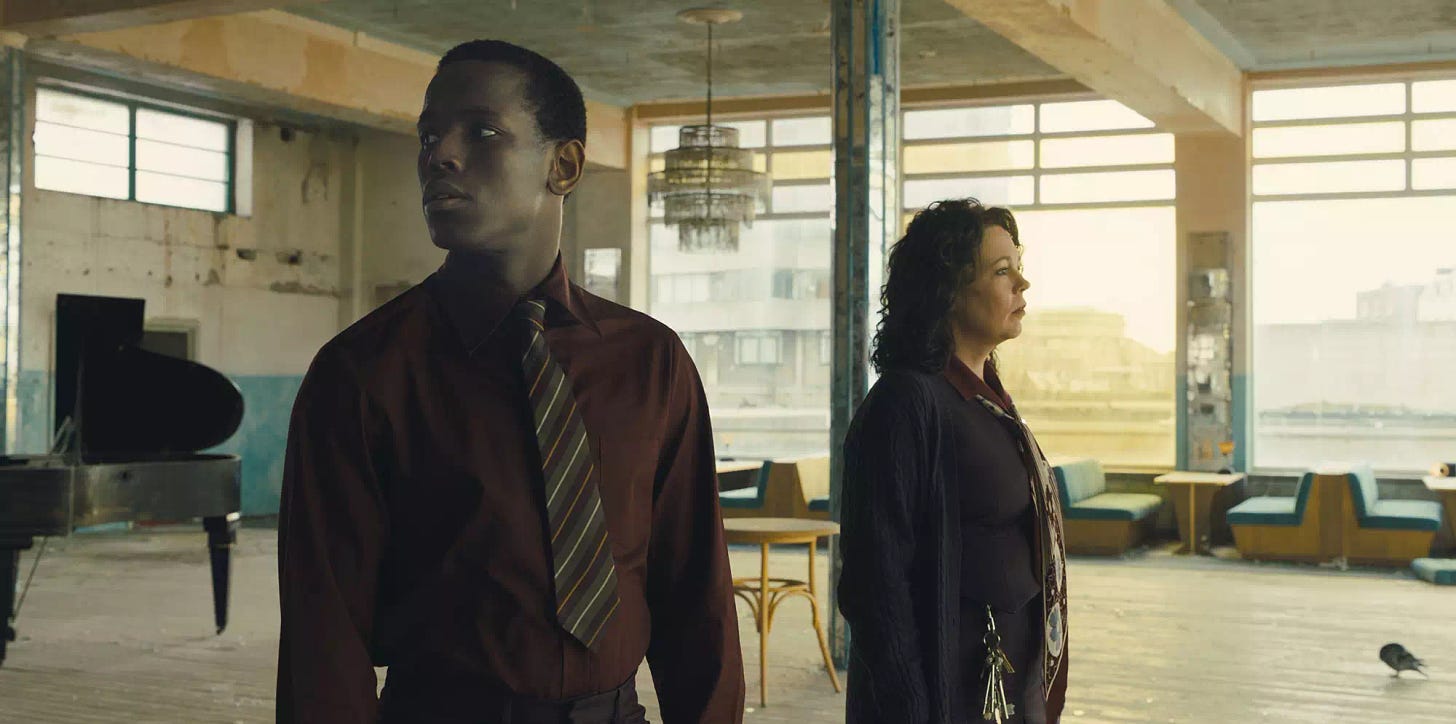In Review: 'The Whale,' 'Empire of Light'
A pair of major directors show only flashes of greatness in disappointing efforts.
The Whale
Dir. Darren Aronofsky
117 min.
Every Darren Aronofsky film is a crucible of the body and soul, often rife with Biblical allusions and played to the absolute hilt. So when Aronofsky’s camera settles in on Charlie, the 600-pound hero of The Whale, he conjures the most repulsive introduction imaginable: a sweaty, wheezing shut-in masturbating to internet porn and giving himself a heart attack at climax. A few scenes later, when Charlie’s nurse friend Liz arrives to settle him down, he casually summons an entire bucket of fried chicken and ravenously binges away, covering the area around his jaw with a shiny layer of undabbed grease. Were it not for Brandan Fraser’s gentle voice and soft, pleading eyes, Charlie would seem more monster than man.
That fusion of the sentimental and the visceral is the narrative engine that drives The Whale, Aronofsky’s worst film to date, one that seeks to affirm Charlie’s humanity but cannot imagine him far enough beyond a conceit. Much of the blame for this falls on the source material, a play by Samuel D. Hunter has adapted for the screen, though Aronofsky doesn’t care much for hiding its stage roots. Like Pi or Mother!, the film turns a limited setting into an intense psychic space from which the characters—and the audience—cannot escape. On the rare occasion that we leave Charlie’s living room and get to the porch outside, you can almost feel the sharp intake of air filling your lungs. Even when a film of his goes this far afield, Aronofsky’s work always leaves a mark.
The Whale never gets more haunting than the elegant image of Charlie teaching an online college course through a video platform, with the faces of all his students surrounding a black “instructor” square in the middle. He tells them that the camera on his laptop is busted, but he’s ashamed of his appearance and feels certain it would be a distraction. He doesn’t even show his face to the delivery guy who leaves pizzas and other junk food on the stoop every night, contributing to his mission to eat himself to death. The opening heart attack is not a joke like those old Chicago Bears skits on Saturday Night Live. Charlie is actively dying of congestive heart failure, and the film is the chaotic process of him putting his affairs in order.
As the days march on and Charlie’s conditions worsen—he refuses hospital treatment, as much out of a sense of fatalism as his lack of insurance—various people cycle in and out of his filthy home in Idaho. His best friend Liz (the always-excellent Hong Chau) does her best to encourage him to get treatment, but she still cares for him when he refuses, monitoring his vitals (BP: 238 over 134) and extending hard love and compassion in roughly equal measure. His estranged daughter Ellie (Sadie Sink) comes back into his life, too, though she excoriates him harshly for leaving her and her mother (Samantha Morton) for she was eight-years-old. Also present is a young religious missionary named Thomas (Ty Simpkins), who makes it his project to save Charlie’s soul, though he’s not without problems of his own.
With the possible exception of Charlie’s relationship with Liz, which at least has the contours of an authentic bond, most of the conflicts in The Whale are overcooked nonsense, contrived for dramatic impact but divorced from any recognizable reality. Sink’s performance as Ellie is particularly dire, intending to project the raw emotions of a rebellious teen, but playing more like an amplified one-note petulance. Thomas inserts Aronofsky’s Biblical themes into the drama, but Hunter’s script gives him a backstory that feels not only inauthentic but unnecessary, given the tension already present in him acting as a spiritual guide to someone who isn’t asking for one.
At its center, though, Fraser gives a truly beautiful performance, even if Charlie evokes Frankenstein’s monster in how he seems simultaneously inhuman and transcendent in his humanity. It’s hard not to take Fraser’s own backstory—his rise and fall as a Hollywood star, his survival of an alleged sexual assault, and now his reemergence as a Gen-X darling—into a film like The Whale, but his work would be superb in any context. Actors have leaned on make-up and bodysuits for award-winning turns before, but the real transformation here is the tender optimism that Fraser brings to Charlie, which feels sincere and true throughout a film that traffics in too much bullshit. Let’s hope for better as Fraser’s second act rolls on. — Scott Tobias
The Whale opens tomorrow in limited release.
Empire of Light
Dir. Sam Mendes
119 min.
Anyone who loves movie theaters should make an effort to watch the opening minutes of Empire of Light, the latest film written and directed by Sam Mendes. They capture the waking moments of The Empire, a once grand, still formidable movie palace on England’s south shore. It’s December 1980. All That Jazz is winding down its run and the concession stand, located at the foot of a grand staircase, is filled with Maltesers and other delights. The Empire may have seen better days and the ballroom its sign still boasts about may have fallen into disuse long ago, but it’s still clearly being treated with love. Mendes, working with cinematographer Roger Deakins, shoots it all with a sensuousness they'll later bring to shots of reels of film and the equipment used to project them. They love this place and their love is infectious. It’s hard not to want to reach out and grab a handful of the popcorn (even if it’s probably stale after sitting out overnight).
If only a different movie followed that opening scene.
To be fair, it takes a while for Empire of Light’s promise to fade. Mendes staffs the place with intriguing, period-appropriate characters, like Janine (Hanna Onslow), a goth-lite usher with a fondness for Siouxsie Sioux, and Norman (Toby Jones), a veteran projectionist who fills his booth with images clipped from movie magazines. The presence of Olivia Colman, coming off a string of unimpeachable performances is, of course, promising as well. But stuck in a film that doesn’t seem to know why it exists beyond making a few pat points about art, friendship, and equality, even she struggles here.
Colman plays Hilary, the Empire’s shy floor manager and a woman who takes her job seriously, perhaps in part because life has seemingly offered her little else to pay attention to beyond a humiliating affair of convenience with her supervisor Donald (Colin Firth), conducted after hours and between screenings in his dingy office. That changes, however, with the arrival of Stephen (Micheal Ward), a new hire who’s trying to put together a few pounds in the hopes of going to university to study architecture. But even in his hometown, he’s reminded that, as the son of immigrants from the Caribbean, he doesn’t fit into others’ vision of what England is supposed to look like.
Stephen and Hilary strike up an unlikely but passionate romance, played well by both Colman and Ward. Yet what begins as a pleasant but underwhelming romance starts to break down once the drama kicks into gear. Hilary struggles with mental illness. Stephen ends up in the hospital after being beaten by skinheads. Mendes stages the film’s big moments as if he were still shooting 1917 and Empire of Light’s initially intimate, small-scale story starts to feel dwarfed by its director’s elephantine stylistic choices. Some obvious storytelling choices don’t help, either. Though she works in a theater, Hilary never takes time to watch movies herself, and if you can’t guess the payoff to that detail, you’ve probably never seen a movie yourself, either. Empire of Light fumbles toward making a grand statement about the power of movies. It’s not wrong about that, but those in search of that power might want to look elsewhere. —Keith Phipps
Empire of Light opens tomorrow in limited release.









"Aronofsky’s worst film to date"
"If only a different movie followed that opening scene"
this is the most disappointing review day since The Reveal launched
Sam Mendes is such an odd case as a "name" director. He gets my attention and makes me interested in whatever film he's working on, but then I look at his IMDb and the gulf between his hits and his misses is soooooo wide. Sad to hear this wasn't one of the hits.
Sadder about The Whale, but I've been skeptical about that one for a while.